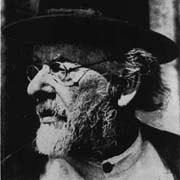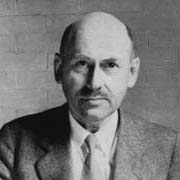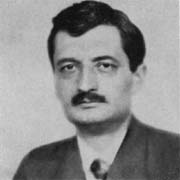
To Open The Sky

|

|

|
| Tsiolkovsky (1934) |
Goddard (1934) |
Oberth (1929) |
Who Was First?
To the burning question, "Who was the first to invent a workable payload-carrying rocket?" there is no clear-cut answer. This did not stop anyone from claiming priority. Britain's William Congreve had used rockets in battle in the middle 19th century, an early achievement rediscovered and touted by the British Interplanetary Society.
In the 20th century, Konstantin Tsiolkovsky had written about liquid fuels, multistage rockets and other advanced concepts in 1903. This Russian schoolteacher was certainly first to work out the theory of rocketry, and to describe its use in travel outside the atmosphere in practical terms. But he built no hardware, and his work went virtually unnoticed even in his own country until Goddard's experiments had "raised the consciousness" of foreign governments. (According to Colonel G. A. Tokaty of the Moscow Military Air Academy, who defected to England in 1948, rocket projects and theories in Russia dated to 1881, well before Tsiolkovsky published.) [1]
Willy Ley reports that Lieutenant-Colonel Baron von Unge, a Swedish inventor, approached Alfred Nobel in about 1890 with an idea for an "aerial torpedo". [2] This, says Ley, was basically an upgrade of the stickless war rockets of William Hale. Ley also mentions one R. Baur, who in 1906 launched rockets carrying explosive charges to 3,000 feet in attempts to ward off hailstorms. [3] These were undoubtedly solid-fuel rockets.
Closer to the present, Goddard received a letter from a Heidelberg student named Hermann Oberth, dated 3 May 1922, requesting copies of his work. But Oberth would later belittle Goddard's work as too pedestrian. At this time, Germany claimed that Oberth was the true father of rocketry. After reviewing Goddard's paper in 1926, Russia's Nikolai Rynin wrote him that Oberth was obviously second. But Stalin was soon crowing about Russia's newly rediscovered schoolteacher. In the Stalin era (and also under Khrushchev) it was characteristic to claim that the glorious People's State had invented everything from jazz to jellybeans. But the claim about Tsiolkovsky, at least, is valid.
It is arguable that Germany, in terms of interest and effort, deserves to be first. Eugen Sänger was experimenting with liquid-fuel rockets during the 1930s. The German Society for Space Travel (Verein für Raumschiffahrt), established in 1927, attracted a number of active experimenters. Its members continually pestered Goddard for information — until 1937, when the Society was disbanded and the military secretly took over rocket work.
However, I know of no German efforts that predate Goddard's. Only Tsiolkovsky has a clear prior claim — and then only to theoretical work. Goddard is unique in having independently assembled a sound theoretical basis for rocket flight, beginning in 1912 if not before, and then having methodically proceeded to build and demonstrate, step by arduous step, the hardware to utilize that theory for practical purposes. Robert Goddard truly is the father of American rocketry. I believe it is also incontrovertible that he is the father of rocketry, period.
NOTES:
[1] — Lehman, p. 136
[2] — Ley, ch. 7
[3] — Ley, p. 105
REFERENCES
PICTURE CREDITS:
Tsiolkovsky — Lehman, crop of picture 36 (ca. p. 175)
Goddard — Lehman, crop of picture 53 (ca. p. 238)
Oberth — Lehman, picture 35 (ca. p. 175)

